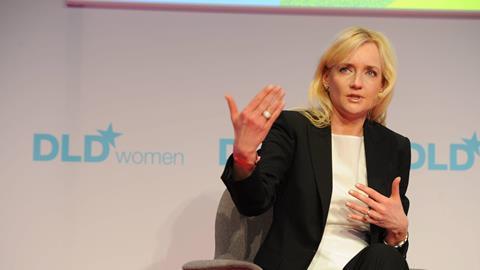A high-profile American venture capitalist is appealing a suspended prison sentence for contempt of court in a £200,000 dispute with London firm Farrer & Co, although a judge today said he does not ‘think much’ of her argument.
Julie Meyer (pictured above), the founder of Ariadne Capital, was held in contempt in January for a ‘deliberate, cynical and continuing’ breach of court orders requiring her to provide financial documents and refusing to attend court in person for debtor questioning.
Mr Justice Kerr imposed a six-month suspended sentence for contempt in January, saying Meyer ‘has shown herself in these proceedings to be a selfish and untrustworthy person [and] her word counts for nothing if it suits her to break it’. Meyer – who is believed to be in Switzerland – also failed to attend a separate hearing in February, at which Kerr issued a warrant for her arrest.
Meyer, 55, is now appealing against the finding of contempt, arguing Kerr did not have jurisdiction because Farrer & Co did not comply with procedural requirements, an argument the firm says is ‘bound to fail’.
She also advanced four other grounds of appeal and was refused permission on the papers for all five grounds by Lord Justice Coulson, who ruled at a directions hearing today that she could appeal on the jurisdiction ground – although he said said her other grounds were ‘hopeless’.
The court heard that Meyer sought permission to appeal on five grounds which were all refused on the papers, at which point she asserted that she did not need permission as they were all ‘linked’ to the finding of contempt, from which she can appeal as of right.
Coulson asked Meyer’s barrister Francesca Perselli: ‘Do you now say, having been refused permission, you do not need permission?’ Perselli said ‘yes’, to which the judge replied: ‘That is completely “my bat, my ball and if I don’t get what I want I’m taking it away”.’ He added: ‘It reflects incredibly badly on your client. I am in my fifth year here … I have never known anyone apply for permission and then say they do not need it.’
Perselli told the court that Meyer was ‘not aware the proceedings existed’ until Farrer & Co obtained default judgment in January 2020 and that she wishes to ‘challenge the quantum of fees’.
But Coulson said: ‘The impression is created that [Meyer] will do anything to avoid paying any money.’ He added: ‘Once she became aware of the [default] judgment, instead of dealing with it in the way that one might have expected she dug a bigger hole.’
Perselli said that Meyer ‘feels that she is being pursued by individuals in Switzerland and journalists in the UK and therefore has a genuine concern’ about disclosing the documents required.
However, Coulson replied: ‘Just pay the money and then she would not have any concerns about journalists or disclosure of information.’ He later said: ‘If you dispute a bill, you pay what you think is due – it really is not rocket science.’
Coulson ruled that Meyer does not require permission to appeal to argue Kerr did not have jurisdiction to find her in contempt and said Farrer & Co’s contention that Meyer needs permission to rely on new points as part of this ground of appeal should be decided by the full court. However, he added: ‘Obviously, I don’t think much of [that] ground.’



























